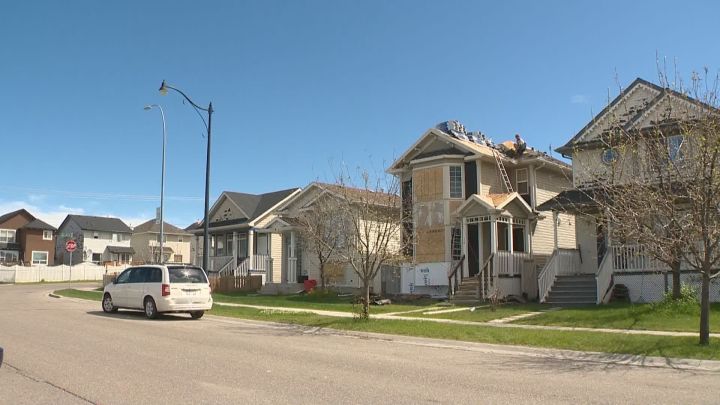The “forward thinking” resilient roofing rebate program that helped hundreds of Calgarians protect their homes is being hailed by Canada’s insurance industry and a disaster research centre.

Thursday, the City of Calgary was awarded the first-ever Resilience in Recovery award from the Institute for Catastrophic Loss Reduction (ICLR) for the rebate program put in place following the billion-dollar hailstorm that hit Calgary in June 2020.
The $3000 rebate helped some 1600 Calgary homeowners install impact-resistant roofing.
“As we look into the future, we know that climate change will increase the frequency and severity of many of the storms that we will see. Damage to buildings and public infrastructure will continue to increase if we don’t build climate resilience into our plans right now,” Calgary Mayor Jyoti Gondek said.
At the time, the provincial government did not offer the financial supports homeowners were looking for, leading Calgary city council to roll out the resilient roofing rebate.

Get breaking National news
“The rebate program was one method that we took. It was an action to futureproof our communities. This program was a win-win for Calgarians and the environment as we switch to building materials that can withstand more extreme weather events,” Gondek added.
Stuart Dalgliesh, the city’s manager of planning and development service, said the program was successful in its goals of education about resilient roofing and assisting homeowners in getting better roofs. Dalgliesh added work is underway to have resilient roofing added to building standards for homes in hailstorm alley, a stretch from High River, Alta., to Rocky Mountain House that sees an increased number and intensity of annual hailstorms when compared to the rest of the province.

“Through the success of the program, we learned just how committed Calgarians are to reducing climate-related risks to their properties by building back better,” Dalgliesh said.
Paul Kovacs, executive director of the ICLR, said his team worked with the city following the 2020 hailstorm the ICLR estimated damages at between $1.5 and $2 billion.
“Calgary ran and took the lead on how to help the community be better prepared going forward,” he said.
“The combination of awareness, incentives and regulation led to an outcome in this city that is really an example for others going through different hazards that keep coming again and again in our country.”
Carol Jardine, president of Canadian property and casualty operations for Wawanesa Mutual Insurance, said Calgary’s leadership set a strong example for municipalities across the country.
“The insurance industry and the Institute of Catastrophic Loss Reduction have always looked for leadership in communities who are prepared to work with their constituents in order to help them become more climate resilient,” Jardine said.
“Climate change is here, and it’s our responsibility as leaders in the community to really protect people and their greatest asset, which is their home and their business.”








Comments
Want to discuss? Please read our Commenting Policy first.